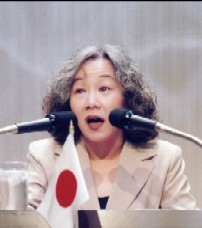'The Iraq Situation'
September 22nd,2004
The Regional Study Center of the JETRO Asian Economy Research Institute
Ms. Keiko Sakai
 A year and 4 months have passed since the end of the Iraq War, but the domestic situation has not stabilized. It is a grave situation with bombings and kidnappings, but this did not all start at once.
A year and 4 months have passed since the end of the Iraq War, but the domestic situation has not stabilized. It is a grave situation with bombings and kidnappings, but this did not all start at once.
When I visited Iraq last July, notice had been given for Japanese to leave Iraq, but it was believed that the situation would improve.However, things have worsened as time goes by, and it is difficult to say how this is being caused.
It is said that Al Qaeda and other terrorist organizations have infiltrated Iraq, but today��s situation is not being caused by these terrorists alone.
Those loyal to Hussein are active, as are those who have been deprived of their special privileges. But the main reason for the instability is the dissatisfaction of the common people, who have been disappointed and disillusioned because their living has not improved in the year and 4 months following the war as they had expected. Although we hear of aid funds being given by the U.S. and also Japan, it is difficult to see how this money is being spent.
When I went to Iraq, the power lines had not been restored, which was understandable, but today, power is supplied for only half a day. Although its oil production is second in the world, because of damage done to its refineries, gasoline and kerosene must be imported.
About half the populace is jobless, and many resort to robbery. We hear of terrorists hiring people to set bombs off for a 100 dollars.Politically, the populace expected to be free and influence politically their lives and living after Hussein��s downfall, but a democratic form of government has not been realized.
On June 28, sovereign power has been transferred to the provisional Iraqi Government, but it is not one who truly represents the people. The provisional Government is made up of Iraqis who had been living abroad for 20 or 30 years as exiles which means that many domestic politicians will be neglected.It is these people who are engaged in anti-America and anti-Government activities, as they are frustrated that they are capable of , but not being included in local politics.
In an attempt to mitigate the situation, a nationwide conference took place in August in an attempt to bring in the rebellious forces in Najaf and the Sunni religious leaders association, but this has failed. Sadr��s force has intensified their warfare and the victims of the warfare are said to be as high as 200 to 300 per day.
Therefore, it has become evident that the Provisional Government does not have the authority to end the fighting, and it took a Shia religious leader to call for a cease fire. Thus the people have been disappointed with a government that has not been able to control the country and listens only to what the Americans have to say.
The economy is also at a standstill. It is difficult for foreign firms to operate in Iraq due to security reasons, and the sums allotted for aid do not reach many of the smaller Iraqi companies.
Iraq benefits from oil payments. This fund was to be used for reconstruction, but in fact the running cost of government such as employees pay, is often delayed, and reconstruction is not proceeding on its due course.
When a government office is given a budget they come under the influence of a political influence which monopolizes its affairs. The returned exiles have little knowledge of the living conditions which prevail and are not aware of the political and administrative mechanism. When they wish to conduct a rational reconstruction program, they come under the sway of politics which favors their own party.
A general election is to take place next January and everyone is deeply engaged in obtaining favorable results for his own group. Therefore, I believe the chaotic conditions now prevailing will continue until then.